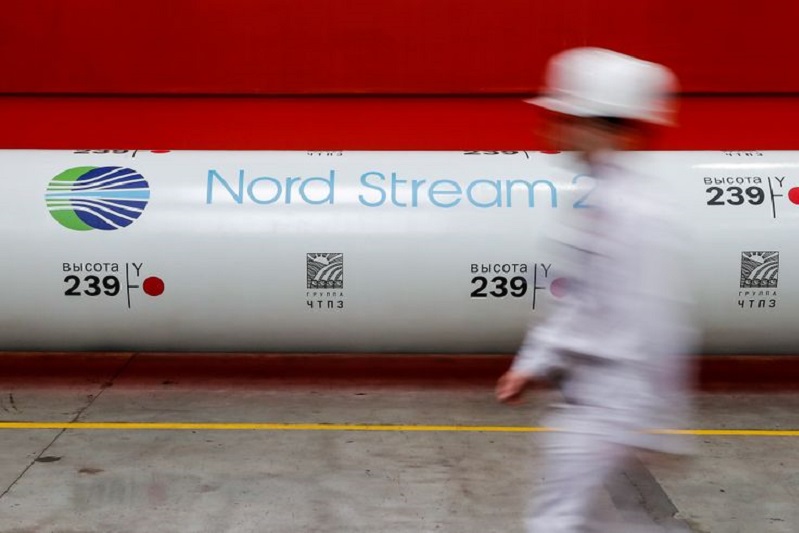(Bloomberg) -- Europe spent years trying to wean itself off Russian gas, but keeping warm this winter means the continent will need it as much as ever.
The continent’s inventories are already at the lowest in more than a decade for this time of year, and they are likely to start the heating season at the bottom end of the five-year range, Citigroup estimates. Refilling storage sites hasn’t been easy as Asia is buying up liquefied natural gas cargoes and Norwegian facilities are undergoing heavy maintenance after pandemic-induced delays.
All of that has left Europe more dependent on Russia at a time the continent’s top supplier is curbing flows through its former Soviet Union partner turned rival, Ukraine. Easing tightness in the European market, already faced with the highest prices since 2008, may therefore hang on Nord Stream 2, a pipeline connecting Russia to Germany that’s faced delays because of U.S. sanctions.
“Much is going to depend upon Nord Steam 2,” said Massimo Di-Odoardo, vice president of global gas and LNG at Wood Mackenzie Ltd. “If Nord Stream 2 doesn’t come on stream and Russia continues not to book capacity through Ukraine, then clearly there might be a risk of price spikes. I doubt we will have blackouts, but certainly the winter looks quite tight at the moment.”
The reliance on Russia is a turnaround for Europe, which has tried to diversify its supplies after the invasion of Crimea and gas cuts through Ukraine that left parts of the continent exposed to freezing weather in 2006 and 2009. Several countries have built LNG terminals, but a decision to close Europe’s biggest gas field is leaving the continent with few alternatives.
Nord Stream 2
Gas inventories in Europe are 25% below normal for this time of year, according to Gas Infrastructure Europe. The Nord Stream 2 pipeline could channel 8 billion cubic meters of gas to Europe in 2021 if commercial flows begin in September and ramp up two months later, said Tom Marzec-Manser, a lead European gas analyst at ICIS. That’s equal to about 10% of Germany’s annual needs.
“People thought Russia was going to book more capacity via Ukraine and that just hasn’t happened in a meaningful way,” said Trevor Sikorski, head of natural gas and energy transition at consultants Energy Aspects Ltd. “Part of it was political, with Russia sending a message to Brussels that it doesn’t need to flow gas through Ukraine.”
The undersea part of the first of Nord Stream 2’s two lines was completed after the offshore pipeline sections laid from Russia and Germany were connected earlier this month. The required pre-commissioning works are now taking place.
German Elections
Some traders are speculating Russia will rush to get gas flowing through the pipeline before the German elections in September. That’s because a strong performance by the Greens could make getting the necessary permits to get the link working more difficult.
There are also hurdles ahead. Russia still needs to get all necessary approvals to start commercial operations and it’s still unclear whether it can get the specialized verification and certification needed.
Germany’s Chancellor Angela Merkel will travel to the U.S. on July 15 and Nord Stream 2 is one of the topics she plans to discuss with President Joe Biden’s administration.
“If NS2 doesn’t arrive, the global market gets tighter,” said Marzec-Manser. “There is obviously the option for Gazprom (MCX:GAZP) to increase supplies, to book additional capacity through Ukraine. But by how much it will be willing to use this is uncertain.”
LNG Cargoes
For now, supplies remain tight as Asia soaks up LNG cargoes to meet higher demand from China to India. Gas flows from LNG terminals in Northwest Europe tumbled to the lowest since January and just three cargoes are slated to arrive before the end of the month, according to Bloomberg tanker-tracking data.
“We are at a tight supply-demand balance right now and if that tightness continues and it is followed by a cold winter, then we can see some interesting prices,” Niek den Hollander, chief commercial officer of Germany’s Uniper AG, said at an event last week.
“Nord Stream 2 has a huge impact in the short term because the EU is facing such historical-low storage levels,” said Sarah Behbehani, a former LNG trading executive who is now managing director at BEnergy Solutions DMCC in Dubai. “If we had higher storage levels, traders wouldn’t be paying so much attention to the project.”
(Updates with Merkel’s visit to the U.S. in 11th paragraph.)
©2021 Bloomberg L.P.
